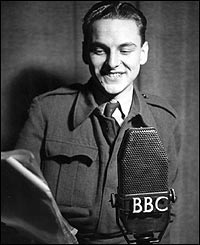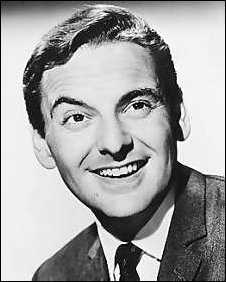The Unforgettable Bob Monkhouse, ITV1 | reviews, news & interviews
The Unforgettable Bob Monkhouse, ITV1
The Unforgettable Bob Monkhouse, ITV1
Penetrating look back at the multi-talented Monkhouse
He wasn't a jack of all trades, said his friend June Whitfield, "he was a master of all trades". The charge of "smarminess" dogged Bob Monkhouse throughout his career, but as this quietly penetrating documentary made clear, he was highly intelligent, multi-talented and had a lot of layers he kept to himself. Actor, scriptwriter, singer, novelist (though they didn't really mention that part), stand-up comic, cartoonist, radio star, gameshow host and posthumous campaigner against the prostate cancer that killed him - the only thing Monkhouse couldn't manage too successfully was his work-life balance.
 I interviewed Monkhouse once, after he'd had one of those "post-modern" rebirths that are visited upon a few choice veterans. He'd been on Have I Got News For You, where - as I'm sure he realised was bound to happen - his performance was like an Aston Martin doing exuberant tyre-burning doughnuts around a bunch of spluttering Skodas. He rang me up later to say thanks for the article, in a tone I'd describe as courteous rather than smarmy.
I interviewed Monkhouse once, after he'd had one of those "post-modern" rebirths that are visited upon a few choice veterans. He'd been on Have I Got News For You, where - as I'm sure he realised was bound to happen - his performance was like an Aston Martin doing exuberant tyre-burning doughnuts around a bunch of spluttering Skodas. He rang me up later to say thanks for the article, in a tone I'd describe as courteous rather than smarmy. But he made sure that all the discipline and technique was concealed from his audiences, and often proved himself capable of improvising entire routines on the spot. Monkhouse had learned his trade, or trades, in the post-war era, but he could make even the most hackneyed themes feel slightly outrageous. Prone to infidelity in his youth ("He liked the ladies," said Cryer), he never seemed to lose his enthusiasm for marital warfare jokes: "My wife has got to diet. I took her to the opera last week and nobody would leave until she sang." Or: "I used to do things deliberately to annoy her. In the mornings I'd wake up - God, she hated that."
But he made sure that all the discipline and technique was concealed from his audiences, and often proved himself capable of improvising entire routines on the spot. Monkhouse had learned his trade, or trades, in the post-war era, but he could make even the most hackneyed themes feel slightly outrageous. Prone to infidelity in his youth ("He liked the ladies," said Cryer), he never seemed to lose his enthusiasm for marital warfare jokes: "My wife has got to diet. I took her to the opera last week and nobody would leave until she sang." Or: "I used to do things deliberately to annoy her. In the mornings I'd wake up - God, she hated that."Share this article
Subscribe to theartsdesk.com
Thank you for continuing to read our work on theartsdesk.com. For unlimited access to every article in its entirety, including our archive of more than 15,000 pieces, we're asking for £5 per month or £40 per year. We feel it's a very good deal, and hope you do too.
To take a subscription now simply click here.
And if you're looking for that extra gift for a friend or family member, why not treat them to a theartsdesk.com gift subscription?

Add comment